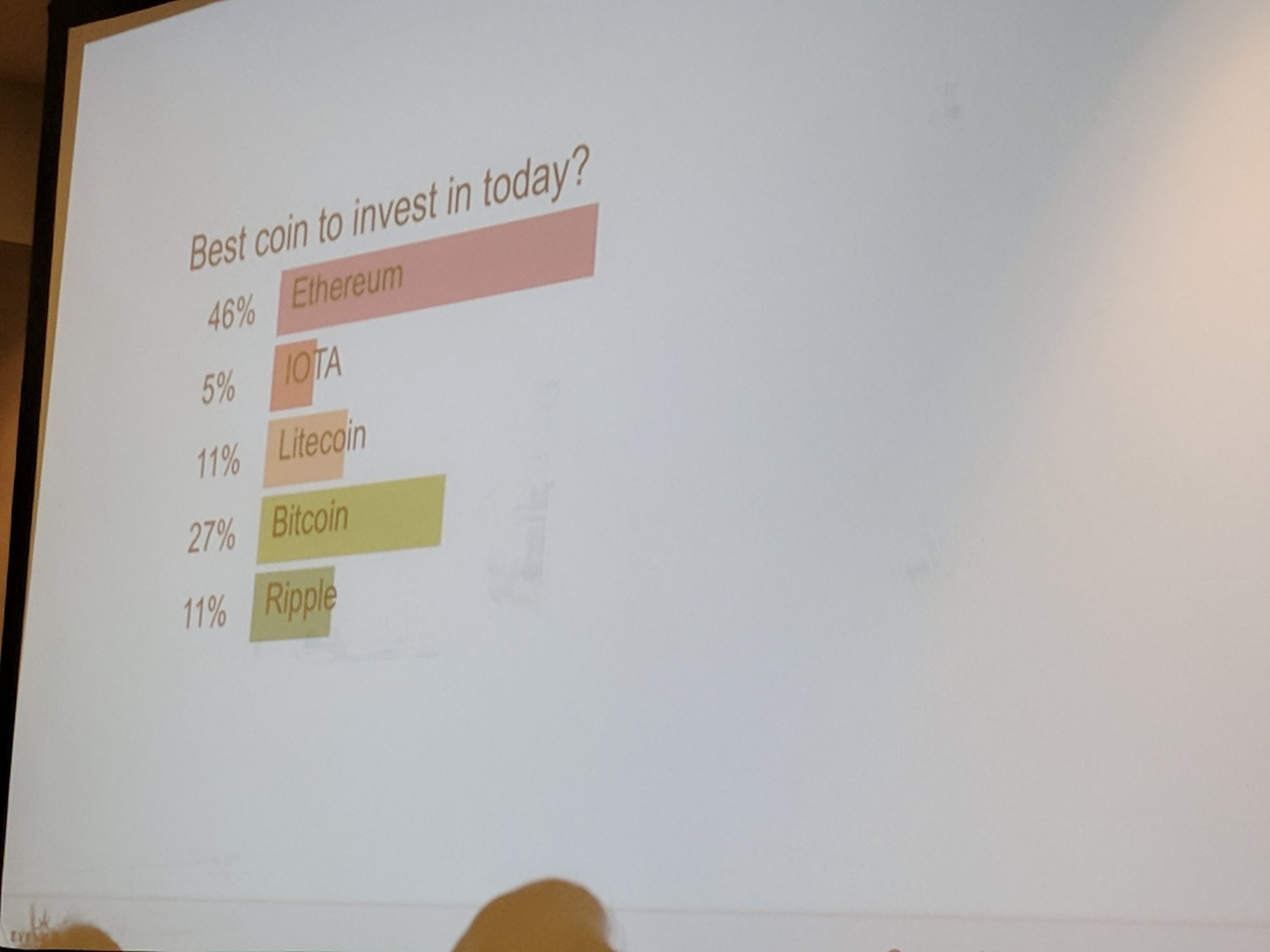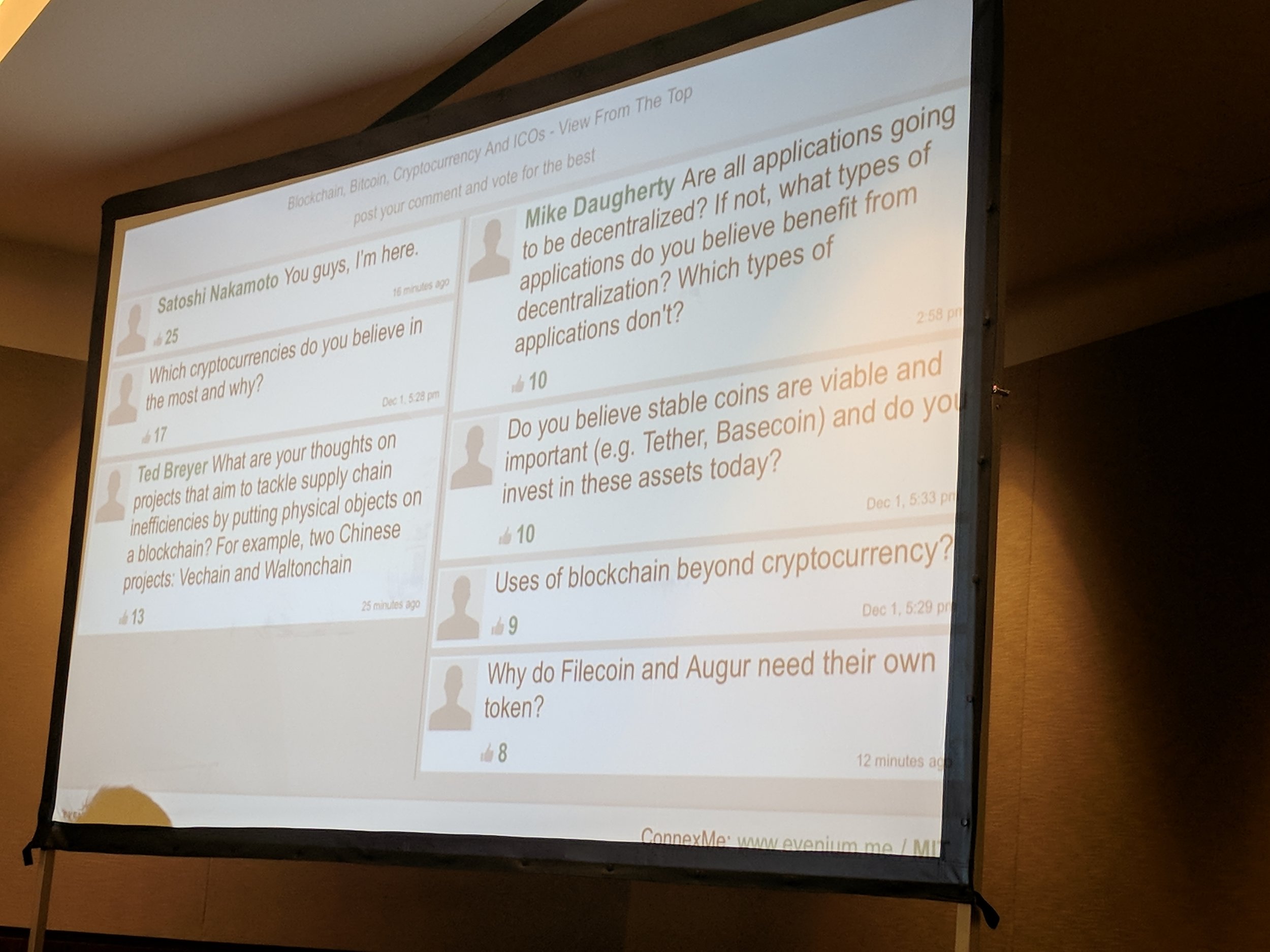MIT Blockchain : View from the Top, Applied Blockchain Series Starts Jan 11th
MIT Applied Blockchain Series Starts Jan 11th - Code BRASSRAT for 10% off
The MIT Applied Blockchain Series kicks off Thursday, January 11th at the Intercontinental Hotel in San Francisco. A 4 part series helping you get from blockchain idea to demo-able product. We've confirmed some great speakers (and more to come!) in the areas of investors/founders, lawyers, tech, marketing/partnerships. Also a Smart Contracts 101 Code Lab from Oakland Blockchain Developers, a generous sponsorship from Blockgeeks to learn blockchain coding (75% off annual plan), Slack community, on-demand video recordings, bonus webinars, chance to pitch at Annual MIT Conference, and Certificate of Completion. Video-only option available for those outside SF. Limited spots left, use code BRASSRAT for 10% off. MIT alums can register for a preferred rate on the Club of Northern California site.
View From the Top : MIT Blockchain Kick Off
Featuring Guests:
Juan Benet, Filecoin, CEO/Founder
Grant Fondo, Goodwin Procter, Partner and Head of Blockchain Practice
Brad Garlinghouse, Ripple, CEO
Joey Krug, Pantera Capital, Partner and Co-Chief Investment Officer
Jake Seid, Stonebridge Ventures, MD (Moderator)
Trading Bitcoin and Crypto
- Brad: With regards to Jamie Dimon, there were 15 JPM employees at Ripple this afternoon. There will be carnage in the ICO world. SEC regulation around securities is designed to protect consumers AND entrepreneurs. Bitcoin is solving a store of value problem. However there are lots of science experiments and that’s not a real use case.
- Grant: Anytime there’s something new and disruptive, people get nervous. You’re investing in the industry, not just one component. What’s the biggest risk in crypto? 1) Dictatorship countries, they will come and clamp down on it. 2) Just like any other risk.
- Joey: Pantera’s investment thesis = crypto assets are a new asset class, correlations are 0 with other asset classes, volatility is sky high. The genesis of new asset class doesn’t happen often in finance. We are getting as much data as possible, level 3 data from all the exchanges since 2011. ICO side = like to invest in things where token is really needed. Someone else can take the open source code, remove a useless token, and offer for free. Most ICOs are garbage. I run a syndicate on Angel list and 95% is garbage. But still trying to find the good stuff. Jamie’s really mad his daughter bought Bitcoin. JPM announced a week ago they are going to trade Bitcoin futures. Store of value is played out. Actual payments are not going to work, it's too volatile (won’t get lower vol than gold) and consumers are not incentivized to use it. They get 2% cash back on credit cards. Excited about stuff like Ethereum and Filecoin bc changing the lives of consumers.
Intrinsic Value: Value vs Price
- Joey: No one can time the market. But you can do things on a short time scale. For a quant fund, look at signals and generate signals for the next hour and next 24 hrs. These markets are very sentiment driven. Network fundamental data varies, most miners sell off as soon as they can, which effects the market. If interested on a smaller time scale, can use quant.
- Brad: Good CEOs are thinking about the next 3 years, not next 3 months. Market cap is $25 billion on Ripple. Don’t watch it moment to moment. If we are successful in driving XRP to solving a liquidity problem, we succeed. There is $27 trillion of dormant capital. You can change the nature of banks’ profitability. Until very recently, institutional money has not entered crypto markets. Ripple owns 60% of XRP. You see institutional demand for assets since anyone who wants to buy in size comes to us. There is fixed supply and increasing demand. When endowments and institutions get in, with the fixed supply and growing demand, you don’t have to go to MIT to know what’s going to happen.
- Juan: What questions should entrepreneurs ask themselves for what’s right for them? If you’re thinking of a token sale first, you’re already wrong. First think about is the token doing something useful? Later you ask how you are going to fund the project. There are lots of really bad projects raising a ton of money. If we were to do a token, how would that work? This can percolate into traditional systems. Imagine if you could buy Uber stock and then use it to pay for Uber rides, imagine also if you had to hold it for a period of time. The invention of stock was to allow people to get dividends, then tech companies started to reinvest dividends. Stocks became more about speculating whether value will go up of the stock (more people want to buy it) vs dividends. These assets are not stock, it's a completely different thing. You can use an asset to track and model the flows. Some large transactions, how can they be structured in this new way? Real estate, etc. You can replace all these steps of people charging tolls. Any kind of market digitally, you can turn into a crypto market. Makes a lot of sense for Uber, Lyft, AirBnB type companies. We used a SAFT structure, listen to your lawyers. Consider using Coinlist to save you time. We probably spent 6 months working on the sale, and wanted to do it by the book. Talk to other projects to see how they do things
SAFTs, ICOs, and Legal
- Juan: We released in August when we were doing our sale. Close to $0.5 billion transacted on SAFTs. At least 10 projects have used it since August. It's only for when you are raising investment before a token is live. If token is live and it’s clearly not a security, you probably don’t need it. CoinList is in partnership with AngelList. CoinList sales are vetted in terms of tech, and there is a certain quality bar. We hope that in the future, all token sales will go through it.
- Joey: Actually 90% of deals we see use SAFT. Everything that has a rent seeker is at risk. Like AirBnB. The most interesting thing to us as investors is seeing an MVP or working protoype. Start working on it, then figure out if it’s a non-profit, a standard VC investment, an ICO. The ICO before Augur raised $1 million. When Augur was designed, we decided we needed a token and didn’t want VCs to have control over it. This is the first time CS and economics have combined in a real way. If you don’t get the tech right, none of the rest of it makes sense.
- Grant: This industry started with programmers. More of the mainstream has been coming in the last 6 months. Any tech starts w core people then starts to spread. We are seeing some mainstream companies using tokens to create better business.
- Brad: Expect if you do an ICO, you will get class action lawyers coming after you. Any time uncertainty exists, lawyers will take advantage of that.
- Juan: Legal will be a big part of what you do. This isn’t just CS and finance, legal is also a really interesting component. I think of law as assembly programming in the 50s/60s. You have to do it by hand. It doesn’t run until court happens, and it might explode on the spot. There are many operating systems all over the world, and they get patched every year. Law is one of the first programming languages we ever had. It's an interesting moment for law. Reshaping law in earnest probably won’t happen for a few years but the foundation is happening now. This is bad news for a lot of lawyers who will get automated away.
Biggest Unsolved Problem, Biggest Innovation, Forecast for Bitcoin Price
- Joey: Biggest unsolved = scalability, but believe it will be solved. We are starting to see transaction parallelization on Ethereum. Quality custodian solutions are coming in 6-9 months. Will retail continue to prop up the market until then? If institutional comes in, the price of Bitcoin could go to $25-30k up to $50k in a few years. A delay of a few years because retail fails to prop it up is the other possibility.
- Grant: When parents can exchange digital currency, that will be a technological breakthrough. If you can Amazon that problem, you’re gold. Risk is regulatory. Ask 10 lawyers, you get 10 opinions. Businesses run well when they have certainty. If they don’t know what the rules are, they will move elsewhere. Don’t think government is anti-crypto, but they do want to regulate it. My guess for price of Bitcoin is $15-20k, probably around $20k.
- Brad: $50k
- Juan: Scalability is a big deal. The programming environments need to improve drastically. Governance is a big unsolved problem. Lots of potential for creating better governance structures. Custodianship. Think there’s a lot of money waiting to get into the space. If it comes in the right timing, Bitcoin could 10x again. Or it could go back down to $1k. As for innovation, IPFS is a new way to do the web that is more censorship resistant, P2P, a way to replace http with a much better protocol. In Turkey Wikipedia was blocked. We took static dumps and put them on IPFS. In Cataluna, there was pretty bad censorship and the government tried to block all the websites and sent a lot of police to stop voting. In that period, people used IPFS to distribute information. Also used in China.
- Brad: Ripple partnered with the Bill and Melinda Gates Foundation, and set up nonprofit called Rippleworks, helping projects scale.
- Grant : Watch the cannabis industry. I used to be a federal prosecutor. Regarding cannabis enforcement, when trafficking or polluting parks, we get involved. Now the strains are much more potent but also use lots more chemicals. If you can prove the quality of marijuana using blockchain, that's a big deal.











